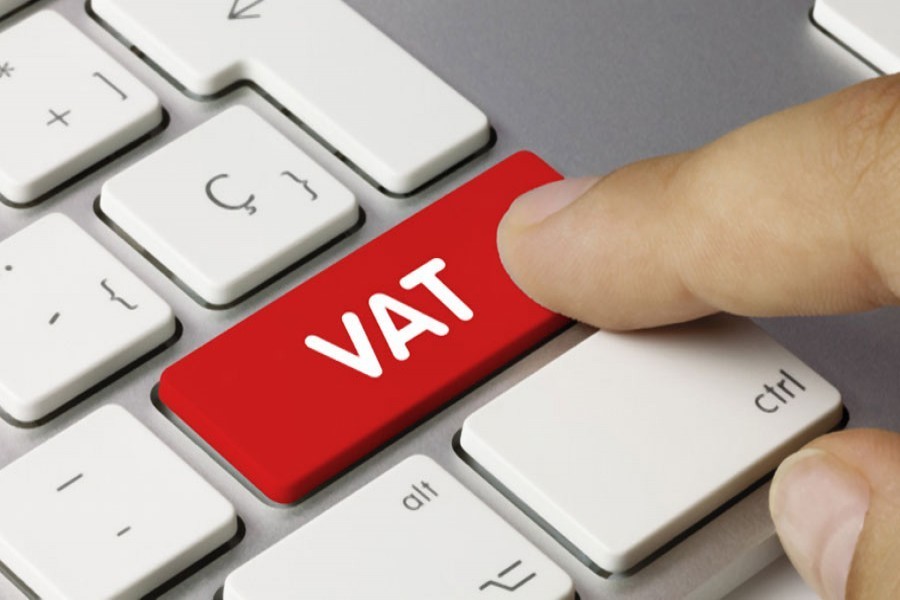Growth in corporate VAT in FY’25 halves
Consumption-tax growth falls to 4.47pc from double-digit highs mainly for business slowdown

Published :
Updated :

Consumption tax-collection growth declined to 4.47 per cent last fiscal year, impacting national revenue, mainly as sluggish business environment hit large businesses hard, sources said.
A senior revenue official also cited graft in VAT collection as another reason, suggesting procedural changes to tap huge untapped potential for raising Bangladesh's comparatively low tax-GDP ratio.
On average, large taxpayers' tax payments remain in double-digit bracket every year. A slide in corporate-tax collection from LTU-VAT wing affects overall revenue growth, often resulting in national-budget shortfall.
The Large Taxpayers Unit (LTU) under the Value-Added Tax (VAT) wing collected Tk 769.53 billion in taxes in the just-past financial year (FY2024-25), against Tk 736.60 billion in FY2024, squeezing the targeted growth.
The VAT collection from large taxpayers fell short of target by Tk 83.37 billion last financial year.
Despite the downturn in business environment, LTU's VAT collection from 25 sectors, out of 34, however, marked a positive growth.
Nine sectors' VAT slid last year, including Bangladesh Telecommunications Regulatory Authority, five luxury hotels, ceramic tiles, telecom equipment, food products, packaging materials, paper, water supply and soap manufacturers, as they saw negative growth in collection last year. Officials have said the last FY passed through several challenges that affected the entire revenue-collection growth by the National Board of Revenue (NBR).
However, despite economic downturn, LTU's VAT receipts grew above 4.0 per cent while aggregate revenue collection by the NBR grew 2.23 per cent last year.
Tobacco is the largest revenue-contributing sector under LTU. Three companies, mainly British American Tobacco, paid Tk 367.61 billion last FY--up by Tk 12.45 billion.
Four mobile-phone companies have paid the second-highest revenue under the LTU, worth Tk 119.75 billion, up by nearly 10 per cent.
Five large gas companies ranked third-largest contributing sector, paying Tk 118.34 billion, in a growth by nearly 4.0 per cent.
Seventeen large commercial banks paid Tk 38.68 billion, up by 5.78 per cent over the corresponding period.
Former member of the VAT wing Farid Hossain, also member of the NBR reform advisory committee, says LTU's VAT collection solely depends on tobacco taxes for long.
"Any minor fall in tax collection from tobacco companies impacts the total revenue collection by the NBR," he told The Financial Express, suggesting that the revenue authority focus on effort-based VAT collection in a switch from dependence on smokers' money.
The LTU's revenue collection remained confined to 10 to 12 sectors, including tobacco, mobile phone, and gas, while large potential remained untapped, he added.
"Our economy has potentiality to raise tax-to-GDP ratio to 16 per cent while it remained 7 to 8," he said, suggesting checking corruption in VAT collection.
Industry-insiders have said VAT collection from cigarette companies usually grows by 12 to 16 per cent every year, but it has declined sharply this time after the government increased Supplementary Duty (SD) in January this year.
Earlier, the NBR chairman said increase in tobacco taxes had not paid off in higher revenue rather it triggered smuggling.
ABM Zubair, Executive Director of anti-tobacco advocacy organisation PROGGA, says, "It's true some cheap cigarettes are entering through different land ports in Bangladesh, but it's insignificant in numbers.
"In general, Bangladesh's cigarette price is still cheaper than in other neighbouring countries, so there is no reason to trigger smuggling."
doulotakter11@gmail.com


 For all latest news, follow The Financial Express Google News channel.
For all latest news, follow The Financial Express Google News channel.